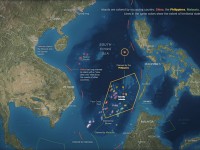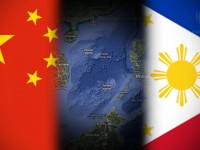Jul 12, 2016
But having made plenty of diplomatic, political and military efforts to hype up the arbitration during the past three years, the US will not sit idle while China tries to safeguard its lawful rights. Such are their differences on the South China Sea issue that many fear they could lead to a military conflict.
Jul 11, 2016
Japan is brokering a joint statement on the South China Sea ruling with its counterparts in the Group of Seven (G-7) advanced economies as part of a "proactive diplomacy" drive, though its own reaction to the verdict tomorrow may be muted.

He Yafei, Former Vice Minister of Foreign Affairs
Jul 11, 2016
The geopoliticalization of the South China Sea by the US has further complicated the security situation in the region and placed more hurdles in the peaceful settlement of disputes. The new president of the Philippines has made remarks concerning possible resumption of dialogue and negotiation on the Nansha Islands issue, a very welcome development.
Wang Hanling, Director of National Center for Ocean Affairs and the Law of the Sea
Jul 11, 2016
The US “freedom of navigation” operations are nothing but an exercise of double standards and selective enforcement, as evidenced by the uneven treatment of Japan and China. The operations’ real purpose is to ensure American interests. The professed aim of upholding international law or UNCLOS is just a façade.
Ma Shikun, Senior Journalist, the People’s Daily
Jul 08, 2016
In the past 20 years, the Philippines reached and signed at least six statements and agreements with China on peaceful settlement of the South China Sea disputes through negotiations. The current unilateral arbitration – deemed illegal by China and at least 60 other countries – is a ploy to legalize its illegitimate seizure of Chinese territory and deny China’s sovereign claims and maritime rights.
Jul 07, 2016
China's foreign minister spoke with U.S. Secretary of State John Kerry by telephone on Wednesday ahead of a key international court ruling on China's South China Sea claims and warned Washington against moves that infringe on China's sovereignty, Beijing's official Xinhua news agency reported.

Rommel C. Banlaoi, Director, Center for Intelligence and National Security Studies
Jul 07, 2016
The new Philippine government is serious in its intention to talk to China in order to peacefully manage the South China Sea Disputes even after the arbitration ruling. However, if China overreacts at the expense of Philippine security, the Duterte administration will face no choice but to succumb to the pressures of other major powers.
Jul 06, 2016
As tensions simmer ahead of an international tribunal’s ruling on Beijing’s claims over the South China Sea, a veteran Chinese foreign policy maker is sending a stern warning about putting the verdict into action.
Dai Bingguo, former State Councilor
Jul 06, 2016
A former top Chinese diplomat argues against framing the South China Sea issue as a strategic issue and interpreting China’s behavior based on the “western theories” of international relations and history, adding assertions that China wants to make the South China Sea an Asian Caribbean Sea and impose the Monroe Doctrine to exclude the US from Asia are baseless.

Tullio Treves, former Judge, International Tribunal for the Law of the Sea
Jul 06, 2016
Relying on certain clauses of the United Nations Convention on the Law of the Sea (UNCLOS) of 1982, to which both the Philippines and China are parties, the Phi
Back to Top

- China-US Focus builds trust and understanding between the U.S. and China through open dialogue among thought leaders.
- Our Offerings
- Topics
- Videos
- Podcasts
- Columnists
- Research Reports
- Focus Digest
- Stay Connected
-
Thanks for signing up!
- Get the latest stories from China-US Focus weekly.